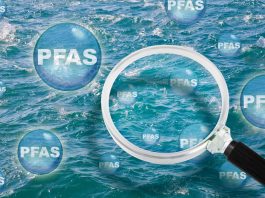A new study has found that per- and polyfluoroalkyl substances (PFAS), known as ‘forever chemicals’, are increasingly being added to US pesticide products.
The persistence of forever chemicals in pesticides contaminates waterways and poses potential threats to human health.
The study is the first-ever comprehensive review of the many ways PFAS are introduced into US pesticide products.
Why are we finding PFAS in pesticides?
Pesticides containing forever chemicals are used throughout the country on staple foods such as corn, wheat, kale, spinach, apples and strawberries.
They are also widely used in people’s homes in flea treatments for pets and insect-killing sprays.
Researchers at the Center for Biological Diversity, Environmental Working Group and Public Employees for Environmental Responsibility compiled data on sources of PFAS in pesticide products.
Those sources range from specific ingredients intentionally added to pesticides to contamination via leaching from fluorinated storage containers.
Forever chemicals are creating a huge threat to the environment and our health
The study’s major discoveries included:
- 14% of all active ingredients in pesticides are forever chemicals, including nearly one-third of approved actives in the last ten years.
- PFOA and PFOS, thought to be among the most toxic PFAS chemicals, have been found in some pesticide products, likely from the leaching of fluorinated containers and other unknown sources.
- Forever chemicals in pesticide products have been found in streams and rivers throughout the country.
- Pesticides can accumulate PFAS from multiple sources, leading to mixtures of different chemicals in containers.
- The current US pesticide regulatory framework is not equipped to adequately identify and assess the risks from PFAS in pesticides.
We must respond to these dangers immediately
“This is truly frightening news because pesticides are some of the most widely dispersed pollutants in the world,” said Nathan Donley, environmental health science director at the Center for Biological Diversity.
“Lacing pesticides with forever chemicals is likely burdening the next generation with more chronic diseases and impossible cleanup responsibilities.”
David Andrews, a senior scientist at the Environmental Working Group, added: “The increasing use of PFAS pesticides will lead to increasing levels of forever chemicals in the environment.
“Their presence not only endangers agricultural workers and communities but also jeopardises downstream water sources, where pesticide runoff can contaminate drinking supplies.”





